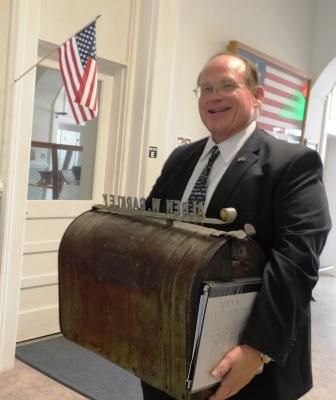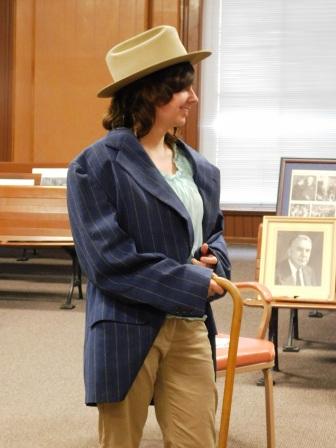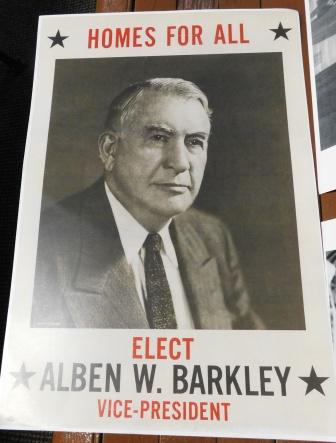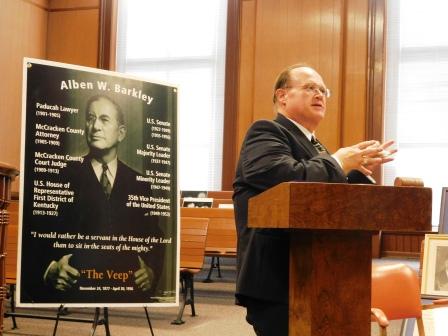Mary Potter, story and photos
Thursday, July 26, 2018 2:32 pm
|
Judge Shea Nickell brings life of a Purchase favorite son to life in courthouse presentation
(Clinton, KY) - Those who watch Julia Louis-Dreyfus' misadventures as Vice President Selena Meyer in "Veep" don't question the short hand designation for her. That's too bad because the man behind the name is a classic American success story, rising from poverty to the halls of power.
Vice President Alben W. Barkley, the first "Veep," created the name because his grandson liked it. The media picked it up and as the cliché goes, the rest is history.
Barkley was a towering figure in American politics from the Great Depression of the 1930s through the Cold War in the 1950s.
Barkley, born in 1877 in a log cabin in the tiny community of Wheel in Graves County, was the oldest of eight children. Barkley worked his way through school, attending M arvin College in Clinton Kentucky and paying his way by working as a janitor. Throughout his life, Barkley retained his connection and his support of his far western Kentucky roots.
arvin College in Clinton Kentucky and paying his way by working as a janitor. Throughout his life, Barkley retained his connection and his support of his far western Kentucky roots.
Kentucky Court of Appeals Judge Shea Nickell is a Barkley historian. Judge Nickell admits that Barkley has been an inspiration to him through his career.
Judge Nickell brought a portion of his voluminous collection of Barkley memorabilia to Clinton for a Hickman County Historical Society "Heroes" program on July 17th.
Using photos, newspaper headlines and Barkley's voluminous mailbox (shown at left) in the historic old second floor courtroom, Nickell traced the path of the Kentucky native. He allowed Haley-Marie Ellegood to try on Barkley's hat, tie, jacket and to hold his cane and gavel. (see photo at right)
The young Barkley studied law in Paducah and went into politics, serving first as McCracken county judge. Barkley moved to the Kentucky House of Representatives, then on to the US House of Representatives, serving as Speaker of that House, then on to the US Senate where he served both as Minority and Majority Leader.
Barkley was a legislative leader in Roosevelt's alphabet programs that grew out of the Great Depression. Federal work programs, like Civilian Conservation Corps which put young men to work, housing programs, a system of social security still in effect today, building schools, post offices, bridges and dams all over America.
Nickell pointed out that TVA, which was a New Deal program to bring electricity to rural areas, could have built their major dam in another spot. Barkley had a large hand in placing the dam that now bears his name in Western Kentucky.
Early in his career, Barkley was mentored by President Woodrow Wilson. Barkley would pass the help on, mentoring young politicians like John F. Kennedy and Lyndon Baines Johnson.
As Senate Majority Leader, Barkley wasn't afraid to disagree with Roosevelt. One falling out was so serious it made headlines in the New York Times. Roosevelt begging Barkley not to quit as Senate majority leader was not forgotten by FDR. When it came time to appoint a supreme court judge, a job Barkley wanted badly, Roosevelt passed him over.
 Harry S. Truman tapped Barkley to be running mate in 1948. At left, a Barkley campaign poster. Affordable housing was an issue in the campaign.
Harry S. Truman tapped Barkley to be running mate in 1948. At left, a Barkley campaign poster. Affordable housing was an issue in the campaign.
Barkley and Truman used technology to barnstorm across America. Barkley loved airplanes and he campaigned by flying into small airports. Truman took the train. The campaign is known for a famously incorrect headline "Dewey Defeats Truman."
During his time as Veep under President Franklin Delano Roosevelt, Truman struggled with being left out of the loop. When he took over as president upon the death of the only president to be elected to three terms, Truman stepped into a job he had not been prepared to handle. As an outsider to FDR's inner circle, Truman had no idea there was a nuclear bomb - until it was used in the waning days of World War Two. Truman vowed his vice president would not sit on the sidelines.
President Truman handled military and international affairs. With the Cold War and the Korean War, Truman had his hands full. He turned much of domestic policy over to Vice President Barkley.
Nickell believes that there are lessons to be learned from Barkley's life.
- Barkley loved technology. He was involved in the big projects of his day - the construction of Hoover and Barkley Dams and the electrification of the country. After World War Two, the multiple military airports around the US were turned over to civilian hands which helped link the country together through air travel.
- If we don't write our own history, someone else will write it for us. They may or may not get it right. They also may write us out as has happened to Barkley in the study of US history. The fourth and last Kentuckian to serve as vice president is not a household name outside of the region that owes much to his support.
- If you don't like the seat at the table life has put you, you can get up and change your seat. The sharecropper boy who worked his way through school sweeping floors and selling door to door had big dreams.
- Tough times don't last but tough people do. Barkley lived through tough times- two world wars, a great depression, the Cold War.
- If you're not cut out for one job, try another. Barkley tried to teach school at Clinton's Marvin College. Discipline in his class was nonexistent for this former class clown.
- Mentors matter. Barkley was mentored by the accomplished men of his age and he passed along the help to others.
- Barkley always believed that he could achieve great things. At a young age, he changed his name from "Willie" to "Alben" believing that it would help him get ahead. His parents encouraged him to do well in school and to work hard.
For Kentucky's favorite son, Alben W. Barkley, whose name is on lakes and dams and lodges, his fame may be local, but his accomplishments changed America.
